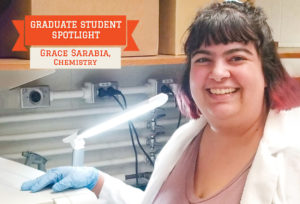Searching for chemicals that indicate the presence of life is at the heart of the research being done by Grace Sarabia, a doctoral candidate in the Department of Chemistry.

In the laboratory, Sarabia attempts to mimic extraterrestrial environments, such as Martian soil or icy worlds like Europa, one of Jupiter’s 79 moons. Then, with the use of Raman spectroscopy, Sarabia is able to analyze these artificial environments to detect biosignatures—clues that indicate a planet’s atmosphere has been influenced by life. This research could not only provide insight into whether life has existed in the past, but also the potential for supporting life in the future.
Currently, her research provides her the opportunity to combine a lifelong curiosity about space with an inherited interest in chemistry. “My grandfather was a chemist, so he used to talk to me about different chemistry concepts when I was small,” Sarabia explains. “My mom used to tell him I didn’t understand him, so he should cut it out. It must have made an impact on me, however, because I did end up pursuing chemistry in college.”